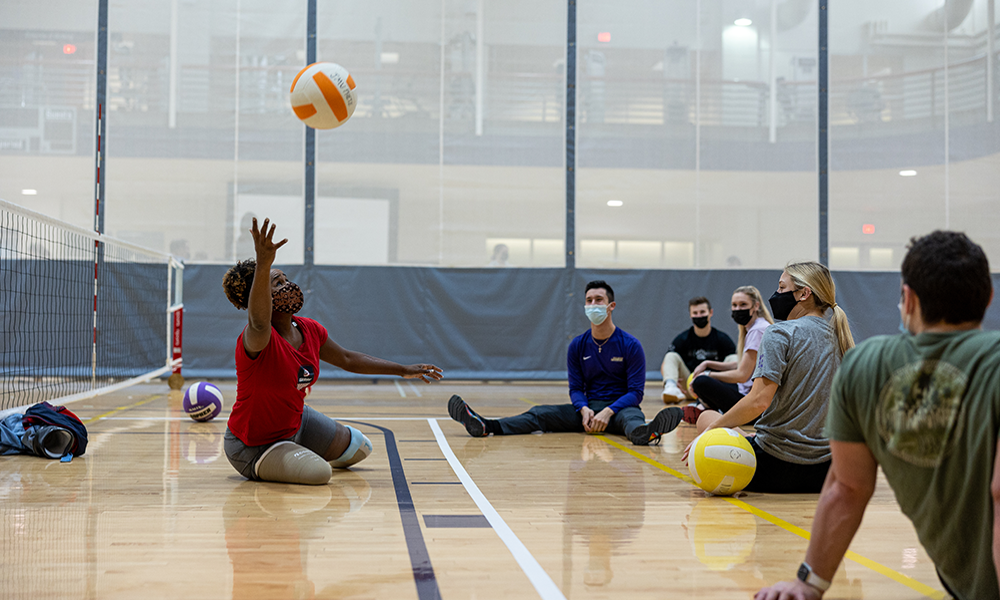JMU disability sport expert offers insights ahead of 2022 Paralympic Games
JMU News
Harrisonburg, Virginia — The world's greatest Para athletes are set to take center stage when the 2022 Winter Paralympics begin their 9-day run Friday in Beijing. One of their biggest fans, James Madison University kinesiology professor Cathy McKay, is ready to cheer them on.
McKay recently finished hosting her annual Paralympic Skill Lab at JMU, where she brings in a variety of Paralympians and athletes who play for the Charlottesville Cardinals Wheelchair Basketball team to interact and facilitate parasport skill stations with JMU kinesiology classes.
McKay also hosted in-service and pre-service teachers for a special session on utilizing parasport education in the K-12 physical education setting.
In addition to being a celebration of athleticism and sporting excellence, McKay said the Paralympic movement and the educational programs connected to the Paralympic movement promote sociocultural attitude change and have worked to shift the paradigm through which Americans view disability.
Here are some more insights from McKay on disability sport and the Paralympics.
Who participates in disability sport?
Sport opportunities for individuals with disabilities tend to be organized around three primary disability groups: Deaf people, individuals with a physical impairment and/or visual impairment, and individuals with intellectual disabilities. Many in the Deaf community do not consider deafness a disability and often compete with those without disabilities with minimal to no modifications needed. While designed for people with disabilities, disability sport can be played by anyone, offering opportunities for able-bodied people to participate alongside individuals with disabilities.
Can any sport be a disability sport?
There are two primary categories of disability sport. The first is based off existing able-bodied sport, but with modifications or accommodations to meet the needs of the athletes (e.g., wheelchair basketball, sitting volleyball, aquatics). The second is designed specifically for persons with an impairment (e.g., goalball). Disability sport is inclusive of Paralympic sport for athletes who compete in the Paralympic Games. Paralympic sports are part of disability sports, but not all disability sports (e.g., rock climbing, kayaking) are Paralympic sports. The term Parasport (Para meaning parallel) is increasingly becoming more popular, and replacing terms such as disability sport, adapted sport and adaptive sport.
What makes for a successful disability sport event/program?
The Parasport education and awareness programming that I lead at JMU is based on Allport’s contact theory, that states that contact with people different from oneself will lead to attitude change if presented under the right conditions. The theory was first proposed when considering how to improve relationships between members of majority and minority groups and has been used to explain human relations in terms of prejudice and difference. Allport theorized that as people come into contact with others different from themselves, their prejudiced ideas would diminish as they come to understand the other person. Contact theory has four components that are brought to life in my programming: equal status contact; collaborative, common goals; meaningful personal interactions and support from authority. Direct contact with Paralympians and local disability sport club athletes help to meet these components and create an overall impactful and engaging Parasport education experience.
Is there a stigma surrounding disability sport?
Individuals with disabilities are often considered different because they fail to fit the description of normalcy that is often construed by beauty, attractiveness and able-bodiedness. In contemporary society, there is a belief that individuals with disabilities are less than or inferior to individuals without disabilities, which easily translates to disability sport being less than or inferior. Disability sport education and awareness, including meaningful and purposeful contact with athletes with disabilities, plays an important role in shaping perceptions of “normal” and “abnormal,” as society places a strong emphasis on physical activity and athleticism. The idealized notion of “normal” is routed in ableist norms and provides a feeling of necessity for disability awareness and education programs that promote sociocultural attitude change and perception growth.
What impact have the Paralympics had in raising awareness/destigmatizing disability sport?
The Paralympic movement and the educational programs connected to the Paralympic movement promote sociocultural attitude change and have worked to shift the paradigm through which Americans view disability. This paradigm shift counters the ableist traditional stereotypes of disability, expand perceptions and advance a culture where individuals of all abilities are celebrated.
###
Contact: Eric Gorton, gortonej@jmu.edu, 540-908-1760
More information about James Madison University, including rankings and recognitions can be found at About JMU.
